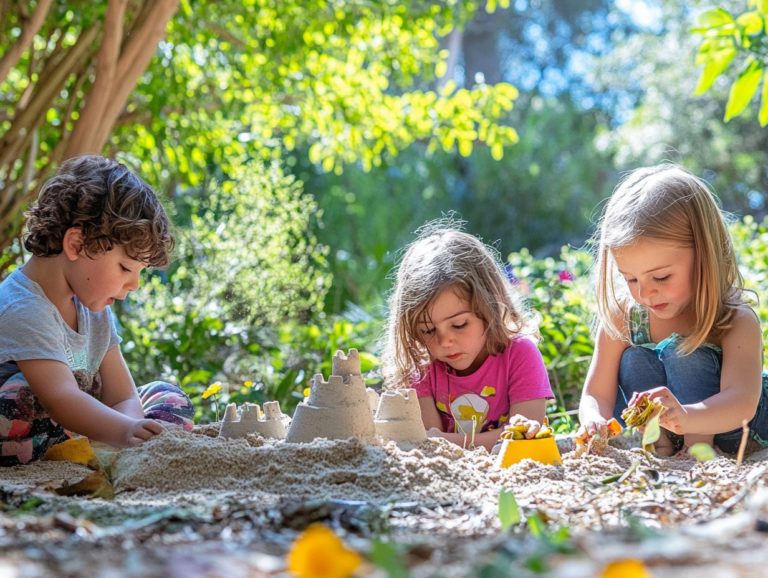How to Address Peer Pressure Mindfully?
Contents
- Understanding Peer Pressure
- Key Takeaways:
- What Is Peer Pressure?
- How Does Peer Pressure Affect Us?
- How to Identify Peer Pressure?
- How to Handle Peer Pressure Mindfully?
- What Are Some Mindful Coping Strategies for Peer Pressure?
- Mindfulness Techniques to Combat Peer Pressure
- How Can Parents Help Their Children Address Peer Pressure Mindfully?
- 1. Encourage Open Communication and Active Listening
- 2. Teach Them How to Make Informed and Independent Decisions
- 3. Promote a Healthy Sense of Self-Esteem and Self-Worth
- Frequently Asked Questions
- How can I address peer pressure mindfully, including social media pressure?
- How can I stay true to myself when facing peer pressure, including in social situations?
- What are some healthy ways to cope with peer pressure and academic pressure?
- Why is it important to address peer pressure mindfully, especially in schools and peer pressure situations?
- How can I assertively say “no” to peer pressure and social media pressure?
- What should I do if I feel overwhelmed by peer pressure or negative peer pressure?
Understanding Peer Pressure
Peer pressure exerts a significant influence, impacting individuals of all ages and shaping their choices and behaviors in ways that can be both beneficial and detrimental. This influence spans across various domains such as academic performance, social media interactions, and everyday decision-making.
Recognizing the various forms of peer pressure and understanding its effects is essential for effectively navigating these complex social dynamics. This includes identifying both direct peer pressure and indirect peer pressure, which can help you build self-awareness.
This article delves into the manifestations of peer pressure, including the impact of social media pressure on mental well-being, and offers guidance on how to identify and manage it with mindfulness. Coping mechanisms and assertive communication are crucial components in handling peer pressure.
Equipped with practical strategies and insights tailored for both individuals and parents, you ll discover methods to cultivate resilience, enhance self-confidence, and promote healthy decision-making in the face of peer influences. These approaches will help you navigate social situations and build a robust support system.
Key Takeaways:

- Know your values and boundaries to stay true to yourself when facing peer pressure.
- Being assertive and communicating your decisions can help you resist negative peer pressure.
- Surrounding yourself with positive influences can help you make mindful choices and overcome peer pressure.
What Is Peer Pressure?
Understanding peer pressure is crucial for youth empowerment and personal growth. It encompasses a range of behavioral influences that can shape your self-image and emotional well-being.
Peer pressure stands as a powerful social phenomenon, compelling individuals to align their behaviors, attitudes, or values with those of their peers. This dynamic can yield both positive influences and negative repercussions.
Grasping the intricacies of peer pressure is essential for youth empowerment, as it significantly impacts their choices and self-image, particularly in social contexts. This influence may emerge through direct peer pressure, where explicit demands are articulated, or through indirect peer pressure, where societal norms subtly guide behaviors without overt confrontation. Often, social media and societal expectations amplify these pressures.
This duality underscores the complex dynamics inherent in peer interactions, revealing the delicate balance that individuals navigate in their social landscapes.
What Are the Types of Peer Pressure?
Understanding the types of peer pressure, including the pressure that individuals place on themselves to conform, can provide valuable insights into how peer dynamics affect your behavior and mental health.
Peer pressure can be categorized into two main types: direct peer pressure, where peers overtly request or demand certain behaviors, and indirect peer pressure, which encompasses the subtle influences of social expectations and group dynamics. Understanding these distinctions is essential for recognizing how peer interactions shape your choices, particularly as you navigate the complex social landscape of youth. Schools and peer pressure often intersect, creating environments where academic pressure and social influences are prevalent.
For instance, you might experience direct peer pressure when friends urge you to experiment with substances. In contrast, indirect peer pressure can manifest in situations where the collective behavior of a group like skipping school or engaging in risky activities subtly nudges you toward conformity.
The effects of these pressures can be substantial. Negative peer pressure often leads to anxiety, diminished self-esteem, and even depression, as individuals struggle to reconcile their values with the expectations of those around them. On the flip side, positive peer pressure like encouragement toward academic success or participation in sports can cultivate resilience and enhance self-worth.
It’s crucial to develop powerful coping strategies that can transform your experience! Building a supportive network significantly bolsters your emotional health and equips you to navigate these pressures with confidence.
How Does Peer Pressure Affect Us?
Peer pressure affects us in multifaceted ways. It impacts not only mental health but also social interactions and personal values. Recognizing these effects is key to developing effective coping strategies.
Peer pressure can profoundly influence your mental health and emotional well-being. It often reveals itself through heightened anxiety and diminished self-esteem, increasing vulnerability to societal norms. Both positive peer pressure and negative peer pressure play significant roles in this dynamic.
These pressures can lead you down a dangerous path of negative behaviors, such as substance abuse or precarious decision-making. Recognizing the impact of peer pressure on youth is essential for building self-confidence and resilience. Effective strategies for peer pressure include building a supportive network and developing assertiveness skills.
By understanding these dynamics, you can navigate social situations with greater awareness and assertiveness, enabling yourself to make choices that truly reflect your values.
What Are the Negative Effects of Peer Pressure?
Negative peer pressure can lead you down a dangerous path, resulting in outcomes like substance abuse, bullying, and a decline in self-esteem. It often nudges you to conform to behaviors that clash with your personal values and overall well-being.
This influence can warp your self-image and create a relentless cycle of fear and anxiety, especially in academic environments where competition and social expectations loom large. Addressing these issues requires strong coping mechanisms and a steadfast support system.
Take, for example, a teenager who feels compelled to try drugs or alcohol at parties just to fit in with their friends. In doing so, they risk not only immediate harmful effects but also the possibility of long-term issues such as addiction or troubled relationships.
The dread of being excluded can push them into bullying, whether as an aggressor or a silent bystander, leaving emotional scars that can last a lifetime for everyone involved.
On the flip side, a robust support system think caring parents, mentors, and true friends can enable you to make healthier choices. Such support allows you to resist negative influences and build resilience when faced with adversity. This is crucial for emotional support and personal growth in challenging social environments.
What Are the Positive Effects of Peer Pressure?
Positive peer pressure can truly be a game-changer in your journey toward self-confidence, emotional well-being, and nurturing healthy relationships. When friends rally behind each other, encouraging behaviors like academic success or engaging in constructive activities, the result is often personal growth and a solid defense against negative influences.
This environment can transform your decision-making into a powerful tool for success! Consider a scenario where a group of students motivates one another to study together for an upcoming exam. This creates a supportive atmosphere where everyone feels enabled to shine.
Not only does this encouragement elevate individual performance, but it also strengthens the connections among peers. Friendships grounded in shared positive experiences cultivate a sense of accountability, prompting you to make healthier lifestyle choices, whether that s hitting the gym or getting involved in volunteer activities.
These interactions help build assertiveness skills, allowing you to effectively resist negative peer pressure. Ultimately, surrounding yourself with positive influences forms a robust support network that reinforces healthy decision-making and nurtures your overall development.
How to Identify Peer Pressure?

Identifying peer pressure is essential for mitigating its negative effects and harnessing its positive potential. Awareness of peer dynamics can greatly improve your mental health and emotional well-being.
Identifying peer pressure begins with cultivating self-awareness and recognizing the subtle social influences that might lead you into uncomfortable situations or choices that clash with your personal values. Pay attention to your feelings and reactions in social settings; you can more easily discern whether you re facing peer pressure be it direct or indirect and make healthier decisions.
For example, you might notice signs of peer pressure manifesting as anxiety when you hesitate to decline invitations for risky activities or feel an intense urge to fit in with a specific group. It’s essential to be attentive to social cues; if conversations often center around risky behaviors or if there s relentless encouragement to engage in activities that conflict with your values, these could very well be red flags.
By practicing self-reflection and establishing personal boundaries in advance, you can build the confidence needed to confront these pressures head-on. Using supportive friends or trusted mentors as sounding boards can offer you reassurance and fresh perspectives. This aids you in dealing with the complexities of social dynamics with greater ease. Having a strong support system can be immensely beneficial in these situations.
How to Handle Peer Pressure Mindfully?
Mindful handling of peer pressure involves developing self-awareness and adopting proactive coping strategies. This enhances your ability to maintain personal boundaries and make healthy personal choices.
Dealing with peer pressure mindfully demands a proactive stance that highlights the importance of self-confidence, personal boundaries, and assertive communication. By honing these skills, you can effectively maneuver through social situations with grace. This approach not only helps in managing peer dynamics but also fosters personal growth and emotional well-being.
Mastering coping strategies can transform how you deal with peer pressure! Cultivating coping strategies and reinforcing your personal values enables you to make informed decisions that resonate with your beliefs, ultimately diminishing the impact of negative peer dynamics.
1. Know Your Values and Boundaries
Understanding your values and boundaries is crucial for navigating peer pressure and making informed personal choices.
Understanding and establishing your personal values and boundaries is essential when it comes to effectively managing peer pressure. This foundation provides you with a clear framework for decision-making and enhances your self-awareness in social situations.
By recognizing what truly matters to you, you can deal with peer dynamics with confidence while staying true to your integrity. Knowing your values empowers you to stand firm when pressures arise! Learning to say no and setting goals that align with your values can greatly improve your self-esteem and emotional health.
This clarity not only aids in resisting external pressures but also cultivates a sense of inner strength, enabling you to prioritize your well-being. Engaging in self-reflection techniques, like journaling or meditation, can be incredibly beneficial on this journey.
These practices give you the space to explore your core beliefs, reflect on past experiences, and identify the values that resonate most deeply with you. By regularly assessing these beliefs, you reinforce your sense of self and build resilience against negative influences. This ultimately enhances your ability to assertively communicate your boundaries without guilt or fear.
As a result, you can navigate social landscapes with grace and confidence. This self-awareness is crucial for your mental health and overall well-being.
2. Be Assertive and Communicate Your Decisions
Assertive communication and self-confidence are key to handling peer pressure effectively. Being assertive and effectively communicating your decisions is essential when it comes to navigating peer pressure. It enables you to express your thoughts and feelings clearly while standing firm in your choices.
By developing assertiveness skills skills that help you express your thoughts confidently you can boost your self-confidence and foster more positive interactions in those challenging social situations.
To hone your assertive communication, consider role-playing scenarios with trusted friends or family. This strategy provides a safe space to rehearse responses to common situations where peer pressure might arise.
Using ‘I’ statements, like “I feel uncomfortable when…” or “I prefer to choose…”, allows you to express your feelings without coming across as confrontational. This method not only reinforces your personal choices but also cultivates an environment where mutual respect flourishes.
Mastering these techniques leads to clearer communication, helping you disarm peer pressure and solidify your commitment to your own values and decisions.
3. Surround Yourself with Positive Influences
Surrounding yourself with positive influences is crucial in navigating peer pressure. A strong support system nurtures healthy relationships and enables you to make constructive choices. Engaging with friends who uplift and encourage your personal growth can significantly lessen the impact of negative peer interactions.
By choosing friends who promote optimism and share your values, you can create a reassuring environment that fosters emotional well-being. These relationships not only provide comfort during challenging moments but also inspire motivation and accountability as you pursue your goals.
To build this supportive network, immerse yourself in activities where you can make friends, such as joining clubs or groups that align with your interests. Being mindful of the traits that characterize truly positive influences like empathy, reliability, and encouragement can help you distinguish between friendships that uplift you and those that sap your energy.
Nurturing these positive relationships can transform your life for the better!
4. Practice Saying No and Standing Up for Yourself
Practicing the art of saying no and standing firm for yourself is an essential coping strategy when faced with peer pressure. It reinforces your self-confidence and helps establish personal boundaries. By developing assertiveness skills, you can navigate social expectations without compromising your values or emotional well-being.
Engaging in role-playing scenarios allows you to simulate various situations that may arise, providing a safe space to rehearse your responses. This practice not only boosts your confidence but also clarifies your personal beliefs and limits.
Assertiveness training often highlights the power of ‘I’ statements, enabling you to express your feelings and preferences without the burden of guilt. By learning to assert your boundaries and consistently saying no when necessary, you enable yourself to maintain control over your choices.
Over time, this practice cultivates a stronger sense of self and earns you respect from others, leading to healthier relationships and reduced stress.
What Are Some Mindful Coping Strategies for Peer Pressure?
Implementing mindful coping strategies can greatly enhance your emotional well-being and resilience when facing peer pressure. By equipping yourself with these tools, you can effectively manage stress and make informed decisions.
These strategies not only promote personal growth but also encourage a healthier response to social influences and expectations, allowing you to navigate challenges with confidence and grace.

Mindfulness Techniques to Combat Peer Pressure
1. Deep Breathing and Grounding Techniques
Deep breathing and grounding techniques are exceptional mindfulness practices that can significantly aid you in managing the anxiety and stress that often accompany peer pressure, creating a soothing sense of calm and emotional support in challenging moments. These practices enhance your self-awareness and clarity when it comes to decision-making.
To start with deep breathing, seek out a quiet space and settle into a comfortable position. Inhale deeply through your nose for a count of four, hold that breath for another four counts, and then exhale slowly through your mouth for a count of six. Repeat this cycle five times to cultivate a profound sense of relaxation.
Alternatively, you might find grounding techniques like the 5-4-3-2-1 method to be exceptionally beneficial. In this exercise, you ll identify:
- Five things you can see,
- Four things you can touch,
- Three things you can hear,
- Two things you can smell, and
- One thing you can taste.
Engaging in these practices during stressful situations not only alleviates immediate anxiety but also enables you to navigate peer pressure with a clearer, more focused mindset.
2. Positive Self-Talk and Affirmations
Engaging in positive self-talk and affirmations can significantly elevate your self-image and emotional well-being. This equips you with the mental resilience needed to withstand peer pressure. By reinforcing a positive internal dialogue, you enable yourself to make choices that align with your personal values.
This practice not only elevates your spirit but also nurtures a mindset that fosters personal growth and achievement.
To craft effective affirmations, it s essential to phrase them in the present tense, honing in on the attributes or outcomes you desire. Instead of saying, “I will be confident,” try, “I am confident and capable.” This subtle shift resonates more deeply with your subconscious.
By regularly incorporating these affirmations into your daily routine whether during morning rituals or moments of self-reflection you can experience remarkable transformations! As you cultivate a healthier self-view, you ll find yourself navigating life s challenges with greater ease, all while inspiring those around you.
3. Engaging in Activities That Bring You Joy and Confidence
Engaging in activities that bring you joy and enhance your confidence is essential for personal growth. It can serve as a powerful antidote to peer pressure. By focusing on your passions and interests, you cultivate a positive self-image and create a fulfilling support system that reinforces your personal values.
Exploring hobbies whether it s painting, playing a musical instrument, or participating in sports allows you to express yourself in a creative and enjoyable way. These activities foster a sense of accomplishment and provide a healthy escape from the negative influences that can arise in social circles.
Joining clubs or groups with like-minded peers enhances your connections and support network. This enables you to share experiences, celebrate successes, and face challenges together. Ultimately, immersing yourself in these enriching pursuits enables you to stay true to your beliefs, bolstering your resilience against the pressures of conformity.
How Can Parents Help Their Children Address Peer Pressure Mindfully?
Parents hold a crucial position in guiding their children to navigate peer pressure with mindfulness. This is largely achieved through open communication and active listening.
By creating a safe space where children are encouraged to share their experiences and emotions, parents can help cultivate resilience and self-esteem. This supportive approach equips children with essential tools to effectively manage social situations, enabling them to make informed choices.
1. Encourage Open Communication and Active Listening
Encouraging open communication and practicing active listening are essential parenting strategies that foster emotional support and enable you to help your youth voice their concerns about peer pressure. This approach strengthens your relationship with your child and equips them with the confidence needed to navigate social dynamics effectively.
To enhance this dynamic, consider implementing regular check-ins. Establish a routine where your children feel comfortable discussing their thoughts and feelings. Creating a non-judgmental space during these conversations allows for honesty and openness, ensuring your kids feel valued and understood.
Active listening plays a pivotal role in this process, as it shows genuine care and investment in their emotions. By validating their feelings, you promote a sense of security and encourage your children to articulate their experiences. This ultimately enables them to process and manage the complexities of peer pressure and societal expectations with greater ease.
2. Teach Them How to Make Informed and Independent Decisions

Teaching children how to make informed and independent decisions is essential for their personal growth and resilience against peer pressure. By helping kids understand themselves better and encouraging them to align their choices with their personal values, you enable them to navigate social situations with confidence.
Utilizing methods such as role-playing scenarios and discussing real-life situations can significantly enhance these vital skills. Through role-playing, children can practice handling various situations, gaining insights into different perspectives and potential outcomes. Engaging in discussions about real-life dilemmas encourages critical thinking and enables them to evaluate consequences, making choices that truly reflect their values. These activities are effective strategies for managing peer pressure as well.
By guiding them through these exercises, you help them develop a deeper understanding of how their decisions impact not only themselves but also those around them. This process fosters a sense of accountability and empathy, equipping them with the tools they need to thrive in their interactions. This also helps build resilience and self-awareness vital for personal growth.
3. Promote a Healthy Sense of Self-Esteem and Self-Worth
Boosting your child’s self-esteem is crucial for helping them stand strong against peer pressure, as it fosters resilience and emotional well-being. When children feel valued and confident in themselves, they re far less likely to yield to negative influences from their peers. This enhances their self-confidence and emotional well-being.
As a parent, you have a pivotal role in this process. Actively celebrate your children’s achievements, no matter how small, to reinforce their sense of accomplishment and help build their self-worth. Encouraging self-care practices like engaging in hobbies, nurturing friendships, and recognizing their unique strengths can significantly enhance a child’s overall self-image. This is crucial in handling peer pressure and social expectations.
Modeling positive self-talk is essential. Guide your children in replacing negative thoughts with affirming ones, helping them cultivate a constructive inner dialogue. Over time, these strategies elevate individual self-esteem and lay a strong foundation for healthier relationships, improved mental health, and better coping mechanisms as they transition into adulthood.
Frequently Asked Questions
To address peer pressure mindfully, it is important to first understand and identify the source of the pressure. Reflect on your values and beliefs and how they align with the pressures you are facing. Then, communicate assertively and set clear boundaries with your peers to resist the pressure in a respectful manner. This is effective against both direct peer pressure and indirect peer pressure.
Peer pressure can be a significant challenge for many. Here are some tips on how to navigate these tricky situations while staying true to yourself.
Staying true to yourself in the face of peer pressure can be challenging. It’s important to remember that your own values and beliefs matter more than fitting in with a group.
Practice mindfulness, which means being aware of your thoughts and feelings. Make decisions that align with your values, even if it means going against the crowd. This helps you handle peer pressure and reinforces personal boundaries.
What are some healthy ways to cope with peer pressure and academic pressure?
Coping with peer pressure can be difficult, but there are several healthy ways to handle it. Engage in activities that make you feel confident and empowered.
Surround yourself with supportive friends and remind yourself of your own worth and values. Seek support from a trusted adult, counselor, or strong support system if needed. Building resilience and emotional support is essential.
Why is it important to address peer pressure mindfully, especially in schools and peer pressure situations?
Addressing peer pressure mindfully allows you to stay true to yourself. It helps you make decisions that align with your values and beliefs.
This approach also helps you develop healthy coping strategies and build self-confidence. Mindful responses to peer pressure can lead to stronger and more authentic relationships with your peers, contributing to healthier relationships and better mental health.
Saying “no” to peer pressure can be intimidating, but it’s possible to do so assertively. Use phrases like “I appreciate the offer, but I have to stick to my own values” or “I understand why you want me to do this, but it’s not something I am comfortable with.”
Remember to stay calm and respectful while setting boundaries with your peers. Assertive communication is key to saying no effectively.
What should I do if I feel overwhelmed by peer pressure or negative peer pressure?
If you ever feel overwhelmed, act quickly and practice deep breathing or other mindfulness techniques to calm yourself down. Remind yourself of your own values and the consequences of giving in to the pressure.
Seek support from a trusted adult or friend if needed. Building a strong support system can significantly help in these situations.
Remember, staying true to yourself is a strength. Embrace it!






